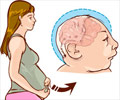As per the results of a Canadian study, a multivitamin pill should be taken daily by all women of childbearing age to reduce risks of having a child with birth defects.
According to the study, the possibility of a wide range of severe birth defects like neural tube defects such as spina bifida, brain-damaging hydrocephalus, heart malformations, truncated or missing limbs, urinary-tract abnormalities and cleft palate can be drastically reduced by ensuring an adequate intake of vitamins and minerals by taking a single, inexpensive pill on a daily basis."The data are really very striking. It seems almost too good to be true that a prenatal multivitamin can have such an impact. But it is true," Gideon Koren, director of the Motherisk Program at the Toronto Hospital for Sick Children, said in an interview.
It is already known from previous study that increase in folic acid levels in the diet of a pregnant woman with supplements and fortification of foods could virtually eliminate horrific birth defects such as spina bifida.
However, a far more wide-ranging effect from prenatal multivitamins is revealed in this study published in yesterday’s edition of the Journal of Obstetrics and Gynaecology of Canada.
"This is more than folic acid and it's not just spina bifida," Dr. Koren said. Based on the study, he said, “All women of childbearing age should be taking a prenatal vitamin daily. Because half of all pregnancies are unplanned and almost all birth defects develop in the first trimester.”
However, a specific prenatal multivitamin should be taken by them, he said. Prenatal multivitamins differ from the standard multivitamins in 3 ways; more folic acid, more iron and less vitamin A -- high levels can be harmful to the fetus.
Advertisement
According to the study, daily intake of prenatal multivitamin results in a: 48 % reduction in neural-tube defects; 39 % reduction in cardiovascular defects; 47 % lower rate of limb deformities; 58 % reduction in cases of cleft palate; 52 % decrease in urinary-tract defects; 63 % drop in hydrocephalus (a dangerous accumulation of cerebrospinal fluid on the brain).
Advertisement
Dr. Koren said, “It is impossible to know which vitamins and minerals are responsible for protecting the fetus from birth defects, but there is really no downside to taking a multivitamin.”
Donald Davis, president of the Society of Obstetricians and Gynaecologists of Canada, agreed with him. "This study fills a gap in that we can now offer women some concrete advice," he said, supporting the recommendation that women of reproductive age take a daily prenatal multivitamin.
One in every 17 babies born in this world has a serious birth defect, according to report published earlier this year.
Nearly 8 million children suffer from a birth defect annually, of which 3.3 million die and another 3.2 million live with severe mental and physical disabilities that often reduce them to a life of poverty and suffering, according to the study.
This study was commissioned by the March of Dimes. Birth defects mainly involve deformities of the heart and spine, and blood disorders. 70% of them are preventable with simple public-health measures and basic medical technologies.
The extent of birth defects on a country-to-country basis was listed in the March of Dimes report. According to it, the prevalence ranges from a low of 39.7 per 1,000 live births in France to a high of 82 per 1,000 in the Sudan. Amongst 193 countries, Canada ranked 14th, with a prevalence of 45.5 birth defects per 1,000 live births. Canada ranked 14th among 193 countries, with a prevalence of 45.5 birth defects per 1,000 live births.
Source-Medindia
GYT










